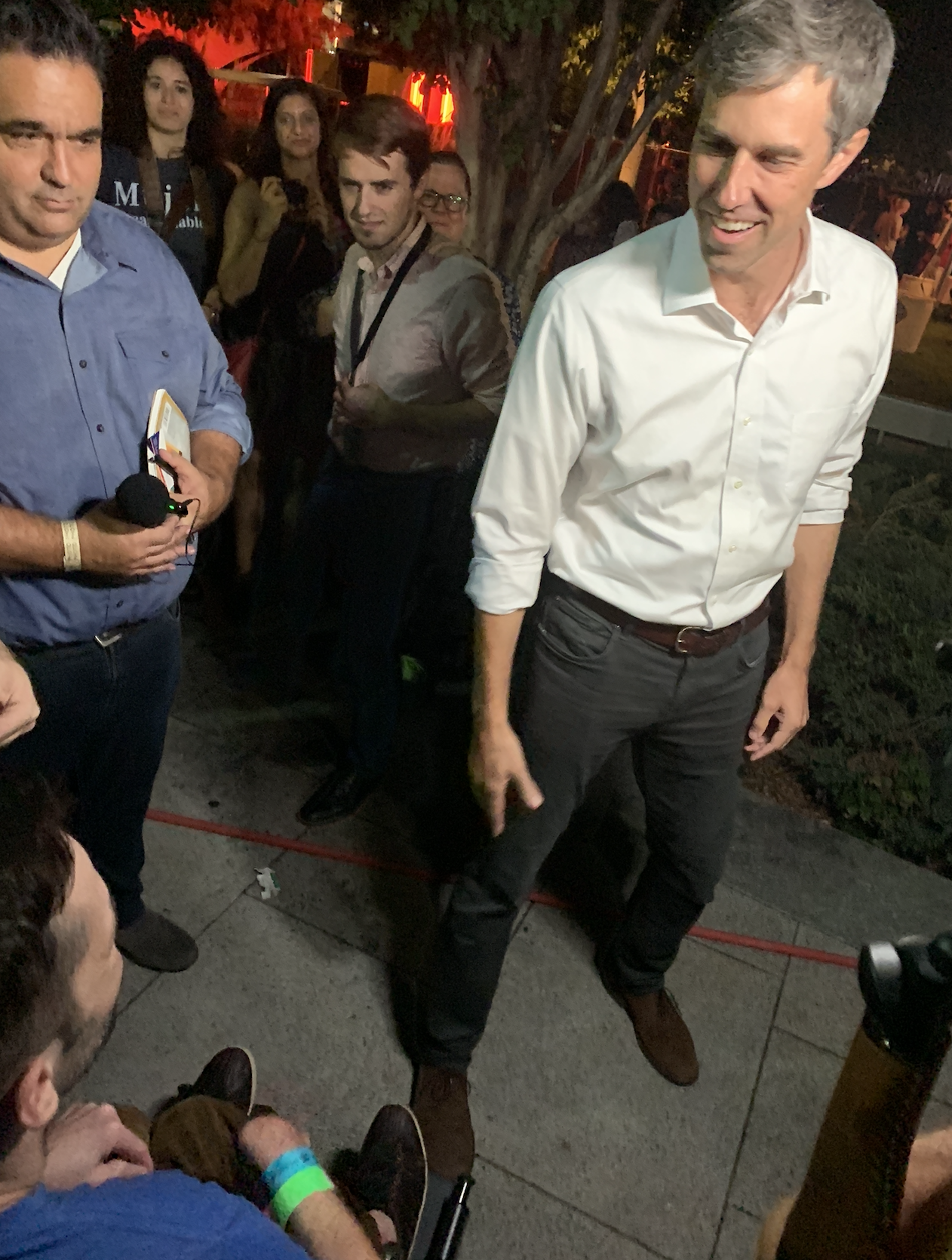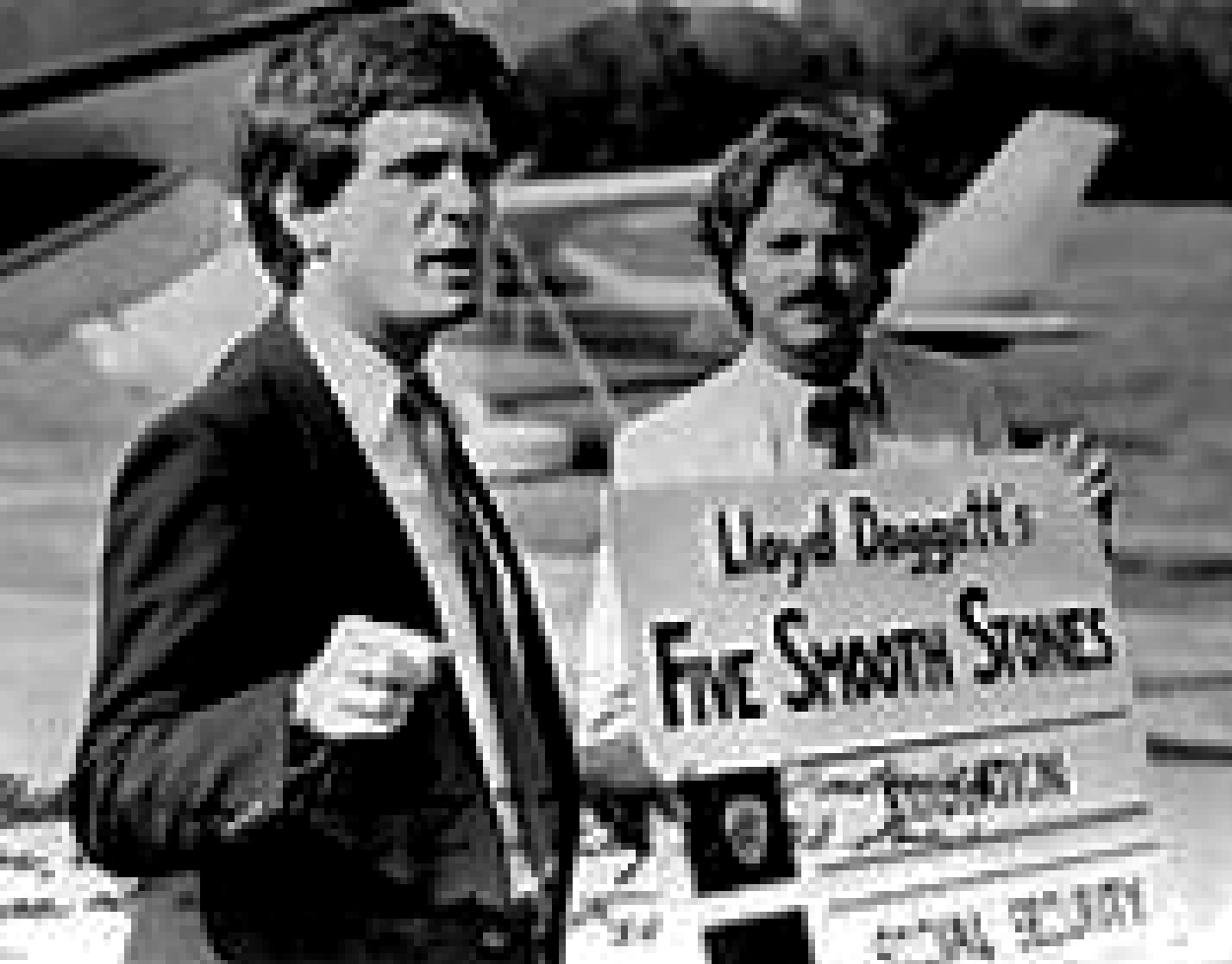On the night of Oct. 7th, a Sunday, in a normally vacant, small city park in the center of downtown Dallas, directly across from the old city municipal building, more than 5,000 people attended a sold-out campaign rally for Beto O’Rourke disguised as a music festival.
The Polyphonic Spree, the nation’s most well-known choral pop rock band donned white choir robes and played a full-set of their psychedelic secular gospel music, complete with a dazzling display of pyrotechnics. In the back, they sold t-shirts reading,”The Polyphonic Spree supports Beto O’Rourke.” Someone else, outside, sold shirts featuring the personage of Willie Nelson and the caption, “Turn Out Texas for Beto for Senate.” Those shirts, which were designed by a couple of friends originally from Missouri, were a sensation.

Earlier in the night, I met up with Beto backstage. “You’ve managed to catch lightning in a bottle,” I told him, while also explaining to him that some of my friends in New Orleans were actually phone-banking for him.
“That’s incredible,” he said. “This is how we’re going to win. All of us working together.”

“This is second-most fun I’ve had since Ted Cruz’s music festival,” I joked.
“Oh shit,” he laughed. “Have you seen the latest SNL?”
“No, not yet.”
“You have to. I bet you can find it on YouTube. The whole thing is a riff on that joke.”
So, I went home and looked it up.
He was right.
There was a palpable- albeit nervous- energy among the thousands gathered that Sunday night in Dallas, and for many Democrats, myself included, the only apt comparison was the experience of witnessing Barack Obama’s nearly-perfect campaign for the presidency in 2008.
After The Polyphonic Spree finished their set, the candidate took the stage, and for over fifteen minutes, he spoke passionately about the issues that have propelled his campaign into the stratosphere.
I brought a conservative friend of mine- a veteran- and watched as he applauded O’Rourke’s comments about the need to seriously consider the strategies and the ultimate purpose of our numerous military conflicts across the globe. My friend isn’t anyone you’d think would be a supporter of the liberal Democrat; his wife, he says, will probably still vote for Ted Cruz. But it wasn’t just O’Rourke’s thoughtful consideration of foreign intervention policies that convinced him. “If Ted Cruz tomorrow decided to come out in favor of marijuana decriminalization, my decision would be more difficult,” he said. “This has nothing to do with the War on Drugs. This is a war against those small children who suffer from terrifying seizures and whose only medicine that works is THC or CBD.”
Beto talks often about the nation’s absurd policies against marijuana, and for him, it also reflects a central truth about Texas culture: Fierce independence, an almost libertarian sensibility about government control. The same beliefs are reflected in his positions on the nation’s immigration policies and the government’s treatment of the approximately 12 million “Dreamers.”
Republicans may call him a radical leftist, but even among die-hard conservatives and evangelicals, the only thing radical about O’Rourke is his willingness to speak commonsense truths about a dysfunctional government led by predominately white, older, conservative men who have been fighting the same culture wars for the past thirty years. Texas, perhaps more than any other state, champions its independence.
“I care as much about babies at the border as I do about babies in the womb,” Tess Clarke, an evangelical Christian woman from Dallas, recently told The New York Times. Ms. Clarke is supporting O’Rourke, “confessing that she was ‘mortified’ at how she used to vote, because she had only considered abortion policy.”
“We’ve been asleep,” she said. “Now, we’ve woke up.”
After Beto left the stage, the main act- the band Spoon- took the stage, and hundreds of people began streaming out. They weren’t there for the music, even Spoon’s energetic cover of The Clash’s “The Clampdown,” a song O’Rourke mentioned in his first debate with the junior senator; they were there for Beto. A week before, in Austin, 55,000 people showed up for a Beto rally featuring Willie Nelson, and similarly, much of the audience thinned after the candidate wrapped up his speech, before Willie even took the stage.


Mark McKinnon is one of the most respected and well-known political consultants in America, and during the past three decades, he has been a force of nature in Texas. Today, he has become even more prominent as one of the stars of the hit TV docu-series “The Circus,” which, more than any other show of its kind, has allowed viewers an unprecedented level of access in the most exclusive corridors of American political power.
McKinnon also knows a thing or two about Louisiana politics. During a recent podcast with Texas Monthly, he was asked about the similarities between a campaign he helped run in Louisiana and what is happening right now in Texas.

“I say that it would probably take the second coming of Jesus for a Democrat to win Texas, but you know what? Beto’s walking on water,” he said.
The host jumped in and quoted this passage of a story McKinnon had written for the publication years ago:
“We drove around the state, parish by parish. (Buddy) Roemer would grab newspaper editors and publishers by the lapels and say, ‘This is our chance to break from the past. We can break from the politics that have dragged this state into the swamp of thieves and crooks, the politics that have landed Louisiana in last place in virtually every meaningful category. For once, don’t look at the horse race. Look at the horse. We can make a difference if you’re willing to make a difference.’ It worked.”
The host then asked, “That’s Beto’s campaign. Right?”
“Wow, I never thought of that,” McKinnon said. “You’re right.”
I wanted to know more about McKinnon’s thoughts on the similarities between the Roemer Revolution and Beto-mania, so last week, I asked him if he’d be willing to answer some questions for The Bayou Brief.
Fortunately, despite his busy schedule (production on “The Circus” is ongoing, and, of course, we’re in the middle of the midterms), McKinnon was happy to oblige.
Our conversation, which was conducted via email, was supposed to be about Beto and Buddy; McKinnon had been Roemer’s press secretary during his historic 1987 campaign for governor against the single-most dominant force in Louisiana politics, Edwin Washington Edwards.
So, it was impossible not to ask him about his lasting impressions of Louisiana.
I began with a couple of questions about the Cajun Prince, the Silver Zipper, the 92-year-old former governor of Louisiana who, after returning home following an eight-year stint in a federal penitentiary, married a smart and beautiful blonde bombshell more than half his age and, thanks to the wonders of science, had a baby with her.
“If Edwin Edwards were to pass away tomorrow, what should be the opening sentences of his obituary?” I asked.
“The original Robin Hood of politics. He stole from the rich and gave to the poor,” McKinnon said. “And Louisiana loved him for it. Until they locked him up.”
McKinnon may now be more commonly associated today with Republican politicians, but he got his start in the business working alongside prominent Democrats, though his most notable candidate was a Republican, Texas governor and future president George W. Bush. However, in 2008, he made a deal with Sen. John McCain, pledging to work for him unless and until Barack Obama became the Democratic nominee. McKinnon deeply admired both men, but from the very beginning, he vowed that he would never work to help defeat Obama. McCain, in a testament to his own integrity, honored their agreement and allowed McKinnon to gracefully exit once it became clear the young Senator from Illinois would become the Democratic Party’s nominee.
“Okay, so what do you think of Edwin Edwards today” I asked.
“One of the all-time scalawags and raconteurs of American politics,” he said. “When I was trying to decide what to do with my life in 1986, a mentor said, ‘If you think you know anything about politics, go to Louisiana and get your PhD. And I did. And he was right.”
According to McKinnon, “Edwin Edwards and Buddy Roemer debating each other was a master class.”
I asked him to reflect on the political dynamics that have changed both Louisiana and Texas during the past decade. “In hindsight, do you think the emergence of the Blue Dogs presaged Republican dominance in both states?”
He was direct. “Louisiana like Texas used to be a two-party state. But the two parties were progressive Democrat or conservative Democrat,” he said, “And the conservatives were Blue Dogs. As soon as there was Republican option, all the Blue Dogs switched.”
“The Roemer revolution and Beto-mania seem to be both grounded in an anti-establishment zeitgeist and a desire to speak more directly and more honestly with constituencies from across the state,” I said. “Are there lasting lessons of the Roemer revolution that you see reemerging? For example, campaign finance fraud? Voter contact?”
“The analogue between between Roemer and Beto,” McKinnon explained, “is authenticity, taking on the establishment and monied interests, and an ability to convince skeptics that change is not only desirable but possible.”
One final question.
“Mark, if you were advising Beto, how would you take the lessons you learned from Roemer and apply them today?” I asked.
“Tune out the noise and stay on the signal. And keep throwing deep — the motto of the Roemer Revolution.”
